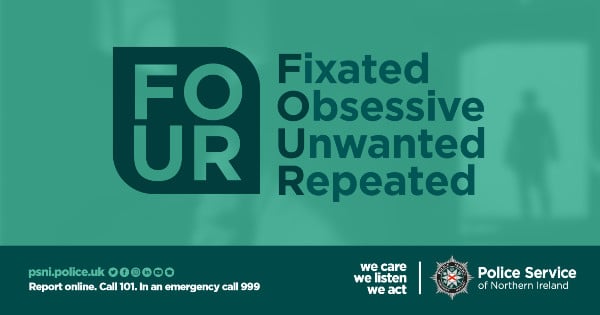What is stalking and harassment?
Stalking and harassment is when someone repeatedly behaves in a way that makes you feel scared, distressed or threatened. There are different types of stalking and harassment and anyone can be a victim. Stalking and harassment are now offences under the Protection from Stalking Act NI 2022.
Stalking
Stalking is like harassment, but it's more aggressive. The stalker will have an obsession with the person they're targeting.
Someone you know could be stalking you; an ex partner or a person you were friends with, or it might be a stranger. If it's someone you know, or knew, it doesn't mean that it's your fault; it's still stalking and it's an offence.
Stalking may include:
- regularly following someone
- repeatedly going uninvited to their home
- checking someone’s internet use, email or other electronic communication
- hanging around somewhere they know the person often visits
- interfering with their property
- watching or spying on someone
- identity theft (signing-up to services, buying things in someone's name)
The four warning signs of stalking
If the behaviour you're experiencing is:
Fixated
Obsessive
Unwanted
Repeated
It's stalking if the unwanted behaviour has happened more than once.

Harassment
Someone you know could be harassing you, like a neighbour, or people from your local area or it could be a stranger.
Harassment may include:
- bullying at school or in the workplace
- cyber stalking (using the internet to harass someone)
- antisocial behaviour
- sending abusive text messages
- sending unwanted gifts
- unwanted phone calls, letters, emails or visits
It's harassment if the unwanted behaviour has happened more than once.
Online stalking and harassment
Social networking sites, chat rooms, gaming sites and other forums are often used to stalk and harass someone, for example:
- to get personal information
- to communicate (calls, texts, emails, social media, creating fake accounts)
- damaging the reputation
- spamming and sending viruses
- tricking other internet users into harassing or threatening
- identity theft
- threats to share private information, photographs, copies of messages
How do I report to police?
Any reports to police about stalking and harassment offences under the new legislation can still be reported the same way by calling 101 in a non-emergency and 999 in an emergency.
We understand it can be difficult. Our officers and staff have received specialist training and are here to listen and support you in any way we can. Importantly, your information could help us bring the offender to justice and make sure you, and other people in a similar situation, are kept safe.
Stalking Protection Orders
Stalking Protection Orders (SPO) provide another tool for us, as well as the courts, to help protect victims and improve their safety.
The orders, introduced under the Protection from Stalking Act NI 2022, enable early police intervention, pre-conviction, to address stalking behaviours before they escalate in severity. Under this new legislation, only we can apply for the orders from magistrate’s court directly, meaning there is no pressure on a victim to make an application.
When in place, an order can require a person to stop carrying out specific actions, but importantly can also impose prohibitions and positive requirements as listed below to further protect the victim and anyone connected to them, such as family or friends, from the risk of stalking.
The conditions of an order could include prohibiting the respondent from:
- entering certain locations or defined areas where the victim resides or frequently visits;
- contacting the victim by any means, including via telephone, post, email, SMS text message or social media;
- contacting or interacting with the victim via third parties, for example friends or family;
- making reference to the victim on social media either directly or indirectly;
- making vexatious applications to the civil court (including the Family Court) which reference the victim;
- recording images of the victim;
- using any device capable of accessing the internet unless it has the capacity to retain and display the history of internet use;
- physically approaching the victim (at all, to within a specified area or as outlined on a map); and/or
- engaging in any form of surveillance of the victim by any means.
The conditions of the order could include positive requirements (if available) to:
- attend an assessment of suitability for treatment;
- attend a mental health assessment;
- attend a drugs and alcohol programme;
- surrender devices;
- provide the police with access to social media accounts, mobile phones, computers, tablets and passwords/codes; and/or
- sign on at a police station.
Under the Act, it is a criminal offence to breach the SPO or fail to comply with the requirements. The maximum sentence for a breach is five years imprisonment.
Support available to victims
- Suzy Lamplugh Trust - https://www.suzylamplugh.org/
This organisation aims to create a safer society by reducing the risk of violence and aggression through campaigning, education and support.
- National Stalking Helpline
Practical advice and information to anyone who is currently or previously has been affected by harassment or stalking.
Phone: 0808 8020300

